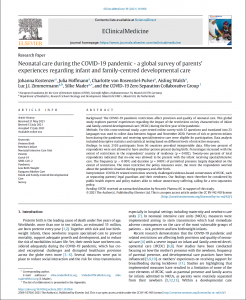
Background
The COVID-19 pandemic restrictions affect provision and quality of neonatal care. This global study explores parents’ experiences regarding the impact of the restrictions on key characteristics of infant and family-centred developmental care (IFCDC) during the first year of the pandemic.
Methods
For this cross-sectional study, a pre-tested online survey with 52 questions and translated into 23 languages was used to collect data between August and November 2020. Parents of sick or preterm infants born during the pandemic and receiving special/intensive care were eligible for participation. Data analysis included descriptive statistics and statistical testing based on different levels of restrictive measures.
Findings
In total, 2103 participants from 56 countries provided interpretable data. Fifty-two percent of respondents were not allowed to have another person present during birth. Percentages increased with the extent of restrictions in the respondents’ country of residence (p = 0·002). Twenty-one percent of total respondents indicated that no-one was allowed to be present with the infant receiving special/intensive care. The frequency (p < 0·001) and duration (p = 0·001) of permitted presence largely depended on the extent of restrictions. The more restrictive the policy measures were, the more the respondents worried about the pandemic situation during pregnancy and after birth.
Added value of this study
This global online survey explored parents’ experiences on key characteristics of infant and family-centred developmental care (IFCDC) during the first year of the COVID-19 pandemic concerning the related restrictions across 56 countries. An alarming rate of parents (>20%) were not permitted to be present with their newborn receiving special/intensive care, which means that the infant did not have the opportunity to experience and benefit from the closeness of the parent/s, neither in form of skin-to-skin contact, KMC or simply in terms of hearing the parents’ voice and smelling their scent. The parents’ role in the care of their newborn is of paramount importance, and their experiences provide unique insights to the challenges of IFCDC during the COVID-19 pandemic.
Implications of all the available evidence
While COVID-19 related restrictions are generally necessary to stem transmission, disregarding evidence-based cornerstones of IFCDC increases the risk of morbidity and mortality of vulnerable infants across the globe. Based on the results of this study and pre existing evidence on the benefits of IFCDC and KMC, we call for a zero separation policy of parents and infants to avoid unnecessary suffering of the youngest and most vulnerable members of society.